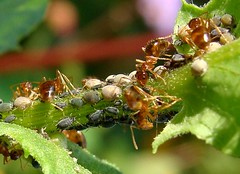
Aphids are a major pest that can destroy many types of plants and cause harmful of damage to the buds, flowers, stems, leaves and fruits. They feed by inserting their stylets (syringe-like mouthparts) in the phloem tissues of the plant, just inside the outer skin of the stem. This is where the plant carries the sugar made in leaves and the aphids drink the sticky liquid.
Besides physical damage to plants, aphids carry several viral infections, including viruses leaf roll, mosaic virus and others. Controlling them is important to maintain healthy plants.
Being hermaphroditic and capable of reproducing parthenocarpy (females can produce offspring without mating) Aphids spread quickly and few individuals can become a huge mass of adhesive power of the bodies.
For Minor Aphid Infestations
Hopefully you've discovered a few aphids already before it has gotten out of hand. If that's the case, try the following:Destroy Aphids with Fingers
For a minor infestation, can be removed by rubbing your fingers over the affected parts and destroy the aphids in this way. This is surprisingly effective in controlling the numbers, but must be done regularly, as it only has one or two people to thrive again.
Soap and Water
Another way to control them is to use soap and water and spray regularly. This works by disabling their ability to adhere to the plant and insert their stylets of feeding, such as soap penetrates the layers of protection, but needs to be done regularly.
For Larger Aphid Infestations
Sometimes aphids can take over your garden in a blink of an eye. If you're just realizing that you have a very serious aphid problem, here are some options for you.
Insecticides
Use insecticides and there are several on the market and led to aphids, but the danger with these is that going to affect any insect and may have an impact on the environment.
Companion Planting
Companion planting is a system that works with aphid infestations. Planting a row of Tagetes (marigolds French) will attract hoverflies and devour aphids by the score for planting these attractive plants allow to act as guardian’s hoverflies natural insect and control the number of aphids on plants.
You can also attract birds to your garden, since it is provided and they can feed on aphids and other pests, while at the same time providing the song and the interest on the site.
Pro Tip: Use Plants that are Susceptible to Aphids
If you are concerned about aphids as virus carriers, buy stock certificate for plants that are susceptible, such as potatoes and blackcurrants.
Certified values means that the growing areas of the plants have been inspected by DEFRA officials and found that a very low number of aphids (usually at higher altitudes, such as Scotland or Ireland) and therefore the probability Viral infection is being reduced. The plants cost more initially, but will get a better crop and prevent the entry of the infection in your garden.
Aphids are a sign of a healthy garden
Aphids are an integral part of most gardens and at least one infestation means that plants are healthy, first, such as aphids’ only attack plants that are growing healthily and get a good source of sugars that travel to their vascular systems. However, to maintain healthy plants you need to control aphids.
Chemicals
As a last resort, use chemicals, but only if you have exhausted other possibilities such as putting the garden to wildlife control the problem and companion planting.
Some plants actively discourage aphids, due to its odor. Garlic planted between rows of beans has been used for centuries as a means to maintain aphid infestation levels manageable.
Accept the Aphids as part of Nature
As with most garden pests, if you do not want to use harsh chemicals, it might be a good idea to just accept the fact that you and aphids have to live together. Aphids are feeding many other animals like birds, ants, predatory insects (like ladybugs) and amphibians so having something in your garden will attract friendly visitors.
It's just a matter of keeping their numbers up levels controllable where you can live in comfort.
Emily Taylor is a kindhearted individual who loves the outdoors; she spends most of her time lately working in her yard and tending to her garden. Through her trials with gardening she has learned a lot about maintenance and pest control and chooses to share her knowledge so that all can enjoy the joys of gardening as much as her.

No comments:
Post a Comment